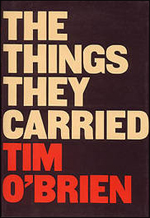| Music | Literature | Film | Index | About |

|
The Things They Carried, Tim O’Brien Houghton Mifflin Company, March 28, 1990 “A book?” I said. “An old one. It’s up on a library shelf, so you’re safe and everything, but the book hasn’t been checked out for a long, long time. All you can do is wait. Just hope somebody’ll pick it up and start reading.” Blood stains p. 201 of my paperback. I tore my pinky on blunt metal molding, while closing the door on an airplane lavatory aloft in the skies from MCI to LAX. At my seat a short while afterward intent upon reading the concluding stories in an impassioned collection, the gnash dripped a vibrant red trickle onto the page’s right margin. The watery smudge refused to wipe away. An imprudent attempt smeared soaked through spatter across the back eighth of the fore edge. Ultimately, the globule dried from deep crimson to a muddy brown: The only chance for the mark to disappear will come when the book fades away altogether. The blot initially struck me as superficial compared to the vital fluids already absorbed within every form of the publication. Classified, perhaps too narrowly, as war literature, men of honor die tragically throughout several interwoven narratives linked to Vietnam. Those meeting their fate are likely based on real or composite souls; the author blends fact and fiction in a style that knowingly captures the ambiguity of authenticity. By telling stories, you objectify your own experience. You separate it from yourself. You pin down certain truths. You make up others. Names listed in the dedication correlate to the roster of characters, alluding to some degree of veracity. Those fallen, directly identified or abstractly invoked, receive a heartfelt tribute. It is their blood that spills over the text. Likewise, the cruor of the author, a surviving veteran, flows alongside that of his comrades, as sure as he once crouched in foxholes among fellow infantrymen while artillery fire exploded feet from toes laced inside government issued combat boots. His pain further swells the saturation. By the time I reached the end of the read, an acute sense of why the tales were written overcame me. The weight of torment compelled their inception. Expression bore salvation. For more than twenty years I’ve had to live with it, feeling the shame, trying to push it away, and so by this act of remembrance, by putting the facts down on paper, I’m hoping to relieve at least some of the pressure on my dreams. I connected intensely with how internal battles sometimes unload through the act of creation. Scribes endure by unpacking words. They also confront a daunting recognition that the opportunity to disencumber is limited. A particular breed of writers are compelled by a specific psychology, and I was one of them. They carried all the emotional baggage of men who might die. Grief, terror, love, longing—these were intangibles, but the intangibles had their own mass and specific gravity, they had tangible weight. They carried shameful memories. They carried the common secret of cowardice barely restrained, the instinct to run or freeze or hide, and in many respects this was the heaviest burden of all, for it could never be put down, it required perfect balance and perfect posture. Slipping the book into my carry-on for landing, I vowed to never leave the impression that a lifetime wrought with struggle, regardless of how mundane or profound, left me mute. I had to continue writing, even if the subject might concern an indeterminate dot staining a used novel headed for a cluttered shelf. Truth told, what could otherwise be considered an incidental blemish is actually something more. The spot tells a tale to anyone receptive enough to notice. And sometimes remembering will lead to a story, which makes it forever. That’s what stories are for. Stories are for joining the past to the future. Stories are for those late hours in the night when you can’t remember how you got from where you were to where you are. Stories are for eternity, when memory is erased, when there is nothing to remember except the story. -MEG
|
 |
||||||